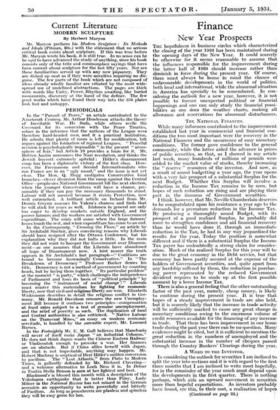PERIODICALS • In the "Pursuit of Peace," an article contributed
to the Nineteenth Century, Mr. Arthur Henderson attacks the theory of Inevitable War. He finds, while others revile the Covenant for its connexion with the Peace Treaties, solace in the inference that the authors of the League were therefore hard-headed men, and it a practical institution. He admits that plenty of room is left for modification, but argues against the formation of regional Leagues. "Peaceful revision is psychologically impossible " in the present "atmo- sphere of fear," but Article 19 provides a basis for it. Mr. Britten Austin announces the Nazi revolution, and thinks the Jewish boycott extremely spiteful : Hitler's disarmament coup has been a diplomatic victory of the first class. How- ever, the Freemasons and Second Internationalists who run France are in an "ugly mood," and the issue is not yet clear. The Hon. Q. Hogg castigates Conservative local branches—clever diversion from the ramp against the Central Office—prophesies National Government till the next election, when the younger Conservatives will have a chance, pre- sumably if they can pay the necessary thousands to stand. Labour will not succeed because it resists Protection, now well entrenched. A brilliant article on Ireland -from Mr. Dennis Gwynn assesses De Valera's chances and finds that he will stick for years as well. Irishmen in general are only too eager to develop markets outside England, and the poorer farmers and the workers are satisfied with Government expenditure. The crisis will come when the large farmers' losses touch the rest, and when expenditure has come to an end.
In the Contemporary, "Crossing the Floor," an article by Sir Archibald Sinclair, gives convincing reasons why Liberals should have resigned after the Ottawa Conference, but his explanation why they did not halts a little. In the main they did not want to hamper the Government over Disarma- ment—so one assumes that the Liberals have abandoned all hope. of Disarmament now. A hint nearer the truth appears in Sir Archibald's last paragraph—" Coalitions are bound to become increasingly Conservative." In "The Breakdown of Democracy" Professor Barker denies his title. Democracy is not a method of government by counting heads, but by laying them together. Its particular problem' at the moment is party," which challenges the independence of Parliament and loses its basis of "political principle" by becoming the "instrument of social change ! " Liberals must master this materialism by fighting for economic liberty, now that civil and religious liberty are won. Elizabeth Wiskemann describes in detail the religious conflict in Ger- many. Ms. Ronald Davidson censures the new Unemploy- ment Bill because it confuses two principles—compensation at fixed lutes subject to a test of genuine unemployment, and the relief of poverty as such. The duplication of local and Central authorities is also criticized. "Native Labour on the Transvaal Mines," an essay on modern economic servitude, is handled by the sarcastic expert, Mr. Leonard Barnes.
In the Fortnightly Mr. E. M. Gull believes that Manchuria will never of itself make Japan "an industrial Colossus." He does not think Japan wants the Chinese Eastern Railway or Vladivostok enough to provoke a war. Her finances are an obstacle. But if China allies herself with Japan, and that is not improbable, anything may happen. Mr. Robert Machray is sceptical of Herr Hitler's sudden conversion to pacifism. The "Lost Atlantis," from Plato to Modern Times, is gallantly defended by Mr. Richard Clavering- and a welcome alternative to Loch Ness it is. In Detour in Tonkin Stella Benson is seen at her lightest and best. Blackwood's is blessed this month with a description of the Yokohama earthquake that is better than Pliny. Lady Milner in the National Review has not missed in the German secession an opportunity to write powerfully and bitterly of Pacifism. As long as peacelovers arc planless and spineless they will be easy game for her.






































 Previous page
Previous page